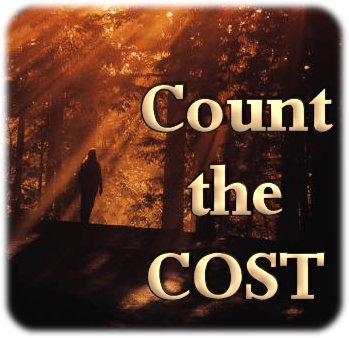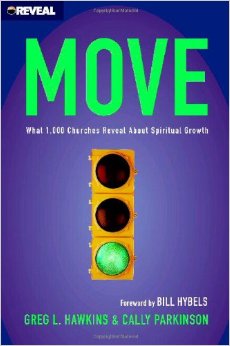In today’s Gospel we read, Jesus said, “The Son of Man must suffer greatly and be rejected by the elders, the chief priests, and the scribes, and be killed and on the third day be raised.” Then he said to all, “If anyone wishes to come after me, he must deny himself and take up his cross daily and follow me. For whoever wishes to save his life will lose it, but whoever loses his life for my sake will save it.”

Jesus is speaking about “counting the cost” of following him and is clearly outlining that following Him and growing in a relationship with him, comes at a price. That’s why most people don’t do it.
In the introduction to the book, MOVE: What 1,000 Churches Reveal About Spiritual Growth by Greg Hawkins & Cally Parkinson, we read that they,
wanted to find out which of the many activities and programs offered by their church delivered the greatest spiritual growth to their people. In other words, they wanted to identify which activities were most effective in helping people grow in their love of God and love of others (Matthew 22:37 –40).
This was to answer a very uncomfortable yet absolutely critical question: Are all the things that we do here at St. Monica, really helping people become fully devoted followers of Christ—which is our mission—or are we just giving you a nice place to go to church?
All the work, all the financial investment, all the programming, all the planning we pour into “church,” is it really making a significant difference in people’s lives?

Move identified several spiritual maturity stages, phases, thresholds through which believers can progress. They also identified two significant groups of parishioners who have experienced one of two “Barriers to Spiritual Growth” People whose faith is “stalled” (up to 13%) and people who are “dissatisfied” with their faith, God, the church, etc… (up to 18%). Thus as much as 26%, 1-in-4, are not growing in their faith, and that’s people who actually attend Mass on Sunday.
No matter what the journey - traveling foreign lands, nurturing children toward adulthood, achieving expertise in a chosen field - progress depends on overcoming the various barriers and obstacles along the way. That’s a given in any kind of journey, and spiritual growth is no exception. What Hawkins and Parkinson did was to empirically prove how many people were willing to pay the price to grow in spiritual maturity, to what extent they were willing to grow as well as to show how many people had hit those barriers and were not growing in their faith.
So let’s look at today’s Gospel. Why would Christ ask the question, “Who do you say that I am?” It was a question that forced the issue. Jesus was “keeping it real” and making the disciples wrestle - even choose – about their understanding, their growth and their commitment to their faith.
Oblate Father Ronald Rolheiser writes about Sister Rachael, O. Carm. (aka Ruth Burrows) who he describes as “a British Carmelite religious sister, author, poet and mystic.” He writes that,
in her autobiography, Before the Living God, she chronicles that in her late adolescent years she possessed a spirit of religious flightiness and a total lack of attraction to religion. Yet she eventually ends up not only being serious about religion but becoming a Carmelite nun. What happened?
I think that it’s a combination of God’s grace and a decision to cooperate with that grace.
Father Ron Rolheiser continues,
Jesus’ presence is mostly quiet and hidden, a plant growing silently as we sleep, yeast leavening dough in a manner hidden from our eyes, summer slowly turning a barren tree green, an insignificant mustard plant eventually surprising us with its growth, a man or woman forgiving an enemy.
God works in ways that are quiet and hidden from our eyes. God is neither dramatic nor splashy, almost non-existent, almost unfelt, largely unnoticed, and easily ignored.
However, while that presence is never overpowering, it has within it a gentle, unremitting imperative, a compulsion towards something higher, which invites us to draw upon it. And, if we draw upon it, it gushes up in us in an infinite stream that instructs us, nurtures us, and fills us.

The “place” where’s this occurs is prayer. And Sister Rachael provides 10 aspects about prayer and the decision to grow in spiritual maturity:
- Prayer is not something you do, it is something God does to you.
- Prayer is that, through which God makes us more like Christ. That is what it is “for.”
- Prayer is about letting God work in us to conform us more closely to our true humanity, which is perfected in Christ Jesus.
- The metric of our prayer is not about feelings or experiences - AT ALL. Prayer is not about our enjoyment of spending time with our buddy Jesus or fulfilling some mandatory obligation.
- If prayer is about us letting God conform us to God, then the sign of whether prayer is “working” will be that we grow in selflessness. This is the only sure sign of “successful” prayer.
- When we become more selfless, we will be less “ourselves” and more Jesus. We will be emptied of our ego. This, not joy, or anything else, is the true criterion–and the true goal. And it is discovered not through what “happens” during prayer, but what happens after prayer.
- Some techniques can be helpful, but they are sometimes used as a substitute for prayer. They can be a subtle, unrecognized, self-seeking desire to attain a certain psychological (spiritual) experience.
- Nevertheless, God blesses all sincere efforts and will look lovingly on all who seek him. If we are truly seeking him, he will enlighten us although this may prove painful. True prayer reveals us to ourselves in our sinfulness and spiritual inadequacy and at the same time enables us to accept it humbly and peacefully.
- Prayer has to be a daily, deliberate, focused habit. start with 15 minutes. If you can’t get to 30 minutes, forget it. You’re not serious about this.
- If you are serious about prayer, If you are serious about growing in your faith life, If you are serious about your relationship with Christ, If you are serious about your vocation, etc… it will hurt. This is because it naturally leads to a greater awareness of sin, the ugliness in your soul and how much we fail. This is harrowing. This is dark. Yet God can, and does, reveal himself - even in the midst of this darkness and in the midst of our sinfulness.
One of the reasons why we struggle with faith is that God’s presence inside us and in our world is rarely dramatic, overwhelming, sensational. Rather, God’s presence, much to our frustration and loss of patience sometimes, is something that lies quiet and seemingly helpless inside us. It rarely makes a huge splash. Yet it is also something impossible to ignore. (Fr. Rolheiser)
So how is God revealing who he is to you? Where has he appeared recently in your life?
Audio version of the homily is here: